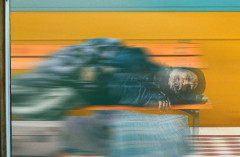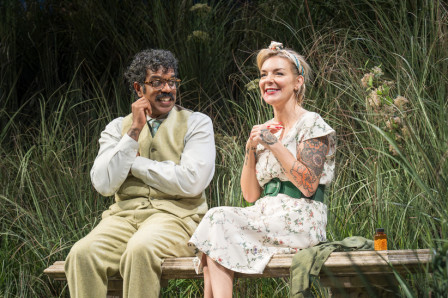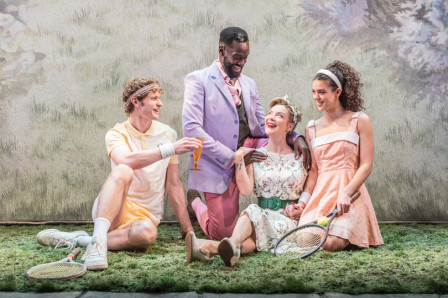Review: EUROPE at the Donmar Warehouse
 Michael Longhurst takes the helm as Artistic Director at the Donmar Warehouse and kicks-off his tenure with a revival of David Greig’s dystopian and prophetic EUROPE.
Michael Longhurst takes the helm as Artistic Director at the Donmar Warehouse and kicks-off his tenure with a revival of David Greig’s dystopian and prophetic EUROPE.
Twenty-five years on from its original incarnation (written in the aftermath of the disintegration of Tito’s Yugoslavia) the play should be filled with current resonances - dealing as it does with the social consequences inherent in the collapse of outdated industries, resultant job losses, and refugees who provide nationalists (and their mindless followers) with an easy target to blame.
Our story takes place at the train station of a provincial border town - once thriving and busy with passport checks, it is now in its death throes and the stationmaster Fret (Ron Cook) anxiously views the gradual eradication of his station’s name from the timetables as prophetic of doom. Meanwhile his assistant Adele (Faye Marsay delivering perhaps the strongest and most well-rounded performance of the evening), often rises early to watch the magnificent engined beasts speed past, wishing she were aboard and embarked on her own exciting journey far from the incessant mundanity. Her dreams are afforded further flights of fancy by the arrival of two refugees - a father and his worldly, disaffected and enigmatic grown-up daughter Katia (Natalia Tena) who epitomise for Adele the difference she wants to make in her life - including romantically. The two soon develop feelings for each other, whilst Adele’s husband Berlin (Billy Howle) personifies for her, the lack of imagination and fear of the unknown which alienates her - especially when he drunkenly directs it towards the strangers.
Britain’s oddly fractious and uncomfortable view of itself as part of a larger continent could have been better interpreted into the on-stage mix, but disappointingly, this is never quite realised despite occasional nods e.g. through the acceptance of Northern and other regional English accents. The piece feels dated, unconvincing and largely flat as a result.
Adele’s impassioned description and excitement at the power and speed of an oncoming train, ends a fairly turgid first half on a much-needed high note. The second half benefits from a marginally faster pace, but most of the characters remain largely unlikeable and it is left to a pyrotechnic display to literally heat things up. By then however, this reviewer was also longing to get a train to anywhere.
Latest News

 Woman in Mind at Duke of York's Theatre Review
7 January 2026 at 11:00
Woman in Mind at Duke of York's Theatre Review
7 January 2026 at 11:00

 Phelim McDermott’s production of Mozart’s Così fan tutte returns to ENO
7 January 2026 at 10:12
Phelim McDermott’s production of Mozart’s Così fan tutte returns to ENO
7 January 2026 at 10:12

 Woman in Mind at Duke of York's Theatre - Production images released
7 January 2026 at 10:01
Woman in Mind at Duke of York's Theatre - Production images released
7 January 2026 at 10:01

 Review Round-Up: WOMAN IN MIND at Duke of York's Theatre
7 January 2026 at 09:47
Review Round-Up: WOMAN IN MIND at Duke of York's Theatre
7 January 2026 at 09:47